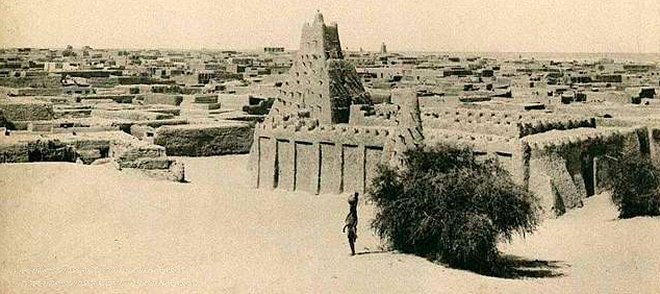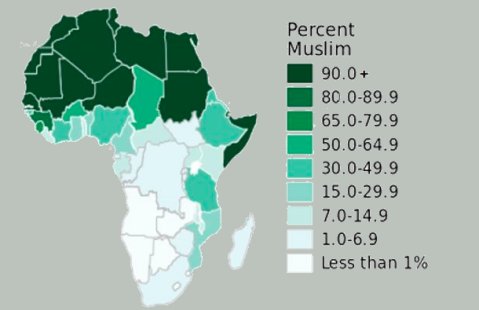Spread of Islam in AfricaTags: Islam in Africa, Spread of Islam in Africa, Islam in Africa History, Islam in Africa Impact, Islam in Africa Today, Islam in Africa Challenges and Opportunities |
|
From this early foothold, the spread of Islam across Africa followed three distinct, and largely separate, paths over several centuries. Following the Arab conquests of the 7th and 8th centuries, Islam became firmly established across North Africa. Cities like Kairouan in Tunisia and Fes in Morocco emerged as major centres of Islamic learning and governance. From here, the faith was carried south across the Sahara Desert not by armies, but by Berber and Tuareg merchants. Following the lucrative trade routes for gold, salt, and slaves, these traders introduced Islam to the great empires of West Africa. Rulers of Ghana, Mali, and later the Songhai Empire, saw the political and economic advantages of converting. Adopting Islam connected them to a vast, prosperous network of trade and diplomacy stretching to the Middle East and beyond. The legendary 14th-century pilgrimage of Mansa Musa, the emperor of Mali, showcased the immense wealth and piety of these West African Islamic kingdoms to the world. On the eastern side of the continent, Islam arrived by sea. From the 8th century onwards, Arab and Persian maritime traders sailed the Indian Ocean, establishing bustling commercial hubs along the coast of modern-day Somalia, Kenya, Tanzania, and Mozambique. This interaction gave rise to the unique Swahili culture and language - a vibrant fusion of Bantu African foundations with Arabic, Persian, and Indian influences. Islam was adopted organically in city-states like Kilwa, Mombasa, and Zanzibar, becoming the religion of a cosmopolitan, urban trading elite. There, the faith was synonymous with maritime commerce and cultural fusion. The faith also spread south from Egypt along the Nile River into Nubia (modern-day Sudan) and expanded from the early communities in the Horn of Africa. This process was more gradual, involving a mix of trade, Sufi missionary work, and political shifts over many centuries. Islam did not simply overwrite existing African cultures; it engaged with it, creating a unique synthesis. This process, known as syncretism, allowed the faith to feel indigenous rather than foreign. The arrival of Islam brought the Arabic script, which spurred a revolution in literacy. While used for the Quran, it was also adapted to write local languages, creating what is known as the Ajami script. This allowed for the recording of local histories, poetry, and knowledge. Timbuktu, with its legendary Sankore University, became a world-renowned centre for scholarship, housing hundreds of thousands of manuscripts on subjects ranging from astronomy and law to ethics and history. |
Islam in Africa |
Islam in Africa |
Islam in Africa | Islam in Africa |
This article about the spread of Islam in Africa is part of our About Africa series for volunteers. More here!
More >
|
|

|
Islamic principles of law (Sharia) and administration provided a framework for rulers to govern large, multicultural empires. It introduced new models for justice, taxation, and diplomacy, integrating African states more deeply into the global community of the time. Art and Architecture: Islamic influence is visible in the stunning architecture across the continent, from the magnificent mud-brick mosques of Djenné in Mali to the intricate coral-stone structures of the Swahili Coast. Artistic expression shifted towards geometric patterns and calligraphy, which blended with local aesthetics to create new and beautiful forms. Today, Islam is the faith of nearly half of Africa's population. The continent is home to some of the world's largest Muslim populations, with Nigeria, Egypt, and Ethiopia leading the way. However, Islam in Africa is far from monolithic. It is incredibly diverse, with the vast majority being Sunni, but also with significant Shia communities and, most notably, a deep and enduring tradition of Sufism. Sufi brotherhoods, or tariqas, like the Mourides in Senegal or the Tijaniyya across West Africa, play a central role in the social and spiritual lives of millions. The modern era presents both challenges and opportunities for Islam in Africa. Political instability and poverty in some regions have been exploited by extremist groups like Boko Haram and Al-Shabaab, whose violent ideologies are a stark betrayal of the faith's historical legacy of peace and scholarship in Africa. These groups represent a tiny, radical fringe and are condemned by the overwhelming majority of African Muslims. Simultaneously, Africa is a hub of Islamic renewal and innovation. There is a growing movement of Islamic intellectualism, vibrant youth cultures blending faith with modern life, a rise in Islamic finance, and countless interfaith initiatives working to promote peace and understanding.
|









